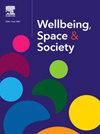“If I was in charge”: A qualitative investigation of water security, gender-based violence and wellbeing in Kenya
IF 2.2
Q2 GEOGRAPHY
引用次数: 0
Abstract
The links between lack of access to WASH (water, sanitation, hygiene) and adverse health outcomes is well documented. There is a recent nascent literature on the links between water security and gender-based violence (GBV) that is relatively sparse; this is surprising given firstly that the global water issue is quintessentially a gendered one and secondly that we know this to be a major issue for women particularly in Sub Saharan Africa. This paper reports on the lived experiences of seniors through oral histories (n = 25) with a particular focus on WASH and gender-based violence using Kisian, Kenya as a case study. Results reveal concerns due to inadequate access to safe water and sanitation facilities and also perceptions of structural gender-based violence where participants reported feeling marginalized by government due to lack of supply of clean piped water. The results also reveal that women are excluded from water governance. In conclusion, gender mainstreaming in water resource management and financial support for gender equity should be adopted by all relevant actors in the WASH sector, particularly given our learnings from the COVID 19 pandemic.
"如果由我负责":对肯尼亚水安全、性别暴力和福祉的定性调查
缺乏饮水、环卫和讲卫生运动(水、环境卫生和个人卫生)与不良健康后果之间的联系有据可查。首先,全球水问题本质上是一个性别问题;其次,我们知道这对妇女,尤其是撒哈拉以南非洲地区的妇女来说是一个重大问题。本文以肯尼亚基西安为案例,通过口述历史(n = 25)报告了老年人的生活经历,尤其关注讲卫生运动和基于性别的暴力。研究结果表明,由于无法获得足够的安全饮用水和卫生设施,人们对基于性别的结构性暴力感到担忧,参与者称由于缺乏清洁的自来水供应,他们感到被政府边缘化。结果还显示,妇女被排除在水资源管理之外。总之,水资源管理中的性别主流化和对性别平等的财政支持应由讲卫生运动部门的所有相关行动者采用,特别是考虑到我们从 COVID 19 大流行病中吸取的教训。
本文章由计算机程序翻译,如有差异,请以英文原文为准。
求助全文
约1分钟内获得全文
求助全文
来源期刊

Wellbeing Space and Society
Social Sciences-Social Sciences (miscellaneous)
CiteScore
2.70
自引率
0.00%
发文量
46
审稿时长
124 days
 求助内容:
求助内容: 应助结果提醒方式:
应助结果提醒方式:


